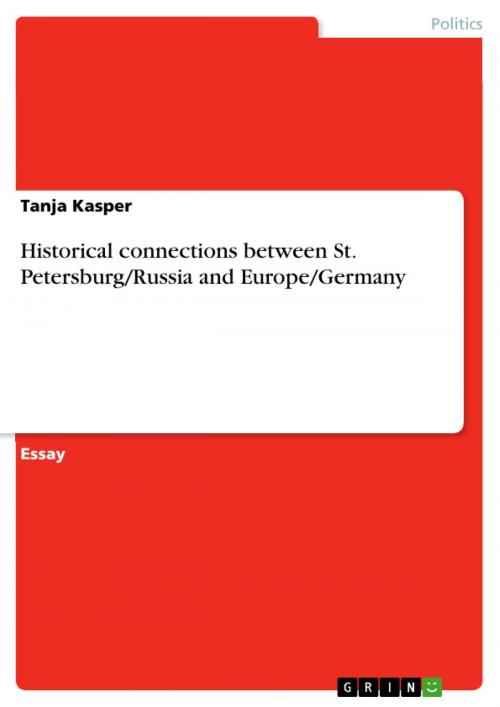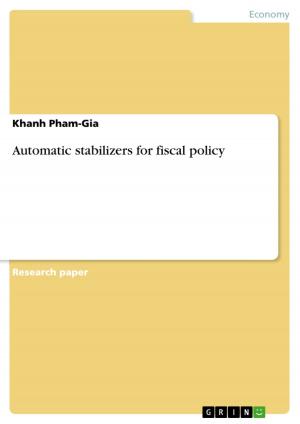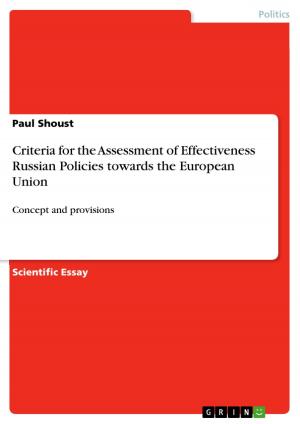Historical connections between St. Petersburg/Russia and Europe/Germany
Nonfiction, Social & Cultural Studies, Political Science| Author: | Tanja Kasper | ISBN: | 9783638529457 |
| Publisher: | GRIN Publishing | Publication: | August 2, 2006 |
| Imprint: | GRIN Publishing | Language: | English |
| Author: | Tanja Kasper |
| ISBN: | 9783638529457 |
| Publisher: | GRIN Publishing |
| Publication: | August 2, 2006 |
| Imprint: | GRIN Publishing |
| Language: | English |
Essay from the year 2006 in the subject Politics - International Politics - Region: Russia, grade: 1,4, University of Vaasa, course: Excursion to St. Petersburg, 0 entries in the bibliography, language: English, abstract: 'St. Petersburg - Russian's window to Europe' you can read in almost every information about the city. But besides being the biggest city in western Russia and an important access to the Baltic sea it has also some important 'personal' relations to Europe or e.g. Germany: Peter I the Great and Vladimir Putin. One, the famous founder of St. Petersburg in 1703, who moved the capital from Moscow to his new preferred location and thereby opened whole Russia to deeper relations to the West. The second one, the current Russian president who aims to lead his country with his immense power more and more to become one of the big global players in other/more aspects than in former times. So both have close biographical relationships to Europe or European countries and through their power as heads of the country, this in turn has been influencing Russian culture, politics and business. On the basis of these St.Petersburg characters I would like to identify some hints for a 'Westernization' of Russia (through St.Petersburg) in Detail. But simultaneously important separating factors shall be mentioned which causes still more reluctant behaviour from companies towards Russia. After all I have to add something crucial about the resources I used. It was surprisingly for me to discover that there are only sparely reliable information about Russian topics in the internet available. So I had to reduce my sources mainly to Wikipedia and my St.Petersburg Travel guide Vis-à-Vis2.3 I tried at least to re-check the information in e.g. comparing the articles of Wikipedia between different languages and other links I found. But still there is perhaps a lack of the scientifically demanded variance and acceptance of used sources.
Essay from the year 2006 in the subject Politics - International Politics - Region: Russia, grade: 1,4, University of Vaasa, course: Excursion to St. Petersburg, 0 entries in the bibliography, language: English, abstract: 'St. Petersburg - Russian's window to Europe' you can read in almost every information about the city. But besides being the biggest city in western Russia and an important access to the Baltic sea it has also some important 'personal' relations to Europe or e.g. Germany: Peter I the Great and Vladimir Putin. One, the famous founder of St. Petersburg in 1703, who moved the capital from Moscow to his new preferred location and thereby opened whole Russia to deeper relations to the West. The second one, the current Russian president who aims to lead his country with his immense power more and more to become one of the big global players in other/more aspects than in former times. So both have close biographical relationships to Europe or European countries and through their power as heads of the country, this in turn has been influencing Russian culture, politics and business. On the basis of these St.Petersburg characters I would like to identify some hints for a 'Westernization' of Russia (through St.Petersburg) in Detail. But simultaneously important separating factors shall be mentioned which causes still more reluctant behaviour from companies towards Russia. After all I have to add something crucial about the resources I used. It was surprisingly for me to discover that there are only sparely reliable information about Russian topics in the internet available. So I had to reduce my sources mainly to Wikipedia and my St.Petersburg Travel guide Vis-à-Vis2.3 I tried at least to re-check the information in e.g. comparing the articles of Wikipedia between different languages and other links I found. But still there is perhaps a lack of the scientifically demanded variance and acceptance of used sources.















